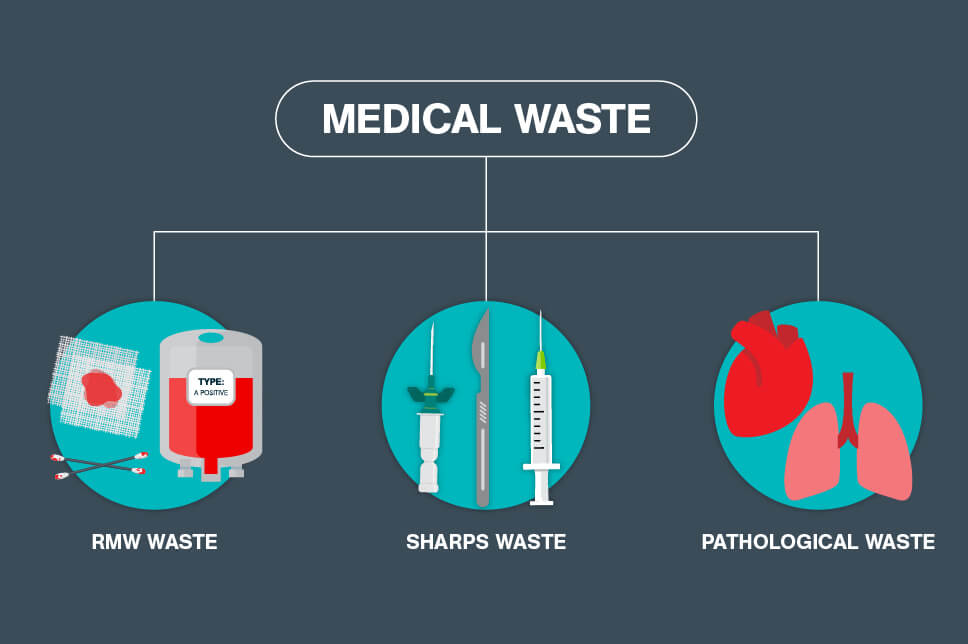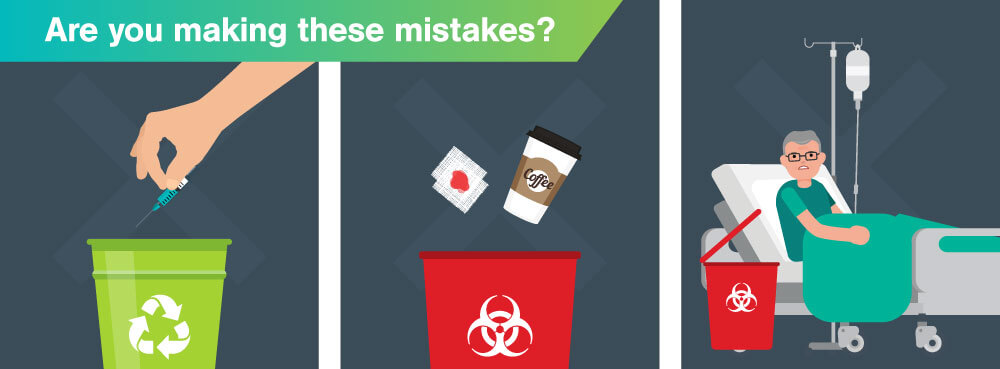The Importance of Properly Handling Medical Waste
Appropriate monitoring of medical waste is of utmost significance in health care facilities. The handling, storage, and disposal of medical waste require strict adherence to guidelines and laws to make sure the safety and security of clients, medical care employees, and the environment. Incorrect management of clinical waste can pose major wellness threats, consisting of the transmission of infectious conditions and injuries from sharp items. Poorly disposed of clinical waste can have harmful impacts on the setting, infecting water resources and soil. Health care centers have legal and governing commitments to effectively take care of medical waste, and failure to conform can result in fines and legal repercussions. By carrying out best methods for secure handling and disposal of clinical waste, health care specialists can minimize these threats and add to a much safer and healthier atmosphere for all. Adequate education and learning and training on waste monitoring are vital for medical care professionals to accomplish their duties in this location.
Health And Wellness Risks Related To Improper Waste Administration
Improper management of clinical waste presents considerable health and wellness risks to both healthcare employees and the public - WasteX Medical Waste Disposal. Clinical waste, which consists of sharps, contagious products, drugs, and contaminated materials, requires correct handling and disposal to stop the spread of infections, injuries, and direct exposure to damaging compounds
Among the key wellness dangers related to incorrect medical waste management is the transmission of infectious diseases. Medical care workers who enter contact with contaminated waste might contract diseases such as HIV, liver disease, or various other bloodborne microorganisms. If medical waste is not correctly disposed of, it can pollute the environment, water sources, and also food, leading to the spread of illness within the area (medical waste removal).
Inappropriate waste monitoring can also cause injuries, particularly from sharps such as needles, scalpels, and busted glass. Unintentional needle punctures can result in the transmission of bloodborne diseases, while cuts from sharp things can trigger serious wounds and infections.
Furthermore, the incorrect disposal of pharmaceutical waste can lead to the contamination of water products. When run out or extra medicines are purged down the bathroom or thrown out inappropriately, the chemicals can seep right into water resources, impacting aquatic life and possibly going into the human food web.
Environmental Influence of Poorly Disposed Medical Waste
Among the considerable repercussions of inadequate monitoring of clinical waste is its detrimental influence on the setting. Improperly disposed clinical waste poses a serious risk to environments, water bodies, and the total balance of the atmosphere. WasteX Medical Waste Disposal. The hazardous products contained in medical waste, such as infectious representatives, pharmaceuticals, and chemicals, can pollute soil, air, and water, bring about prevalent air pollution and deterioration
When clinical waste is not properly segregated, dealt with, and disposed of, it can locate its means right into water bodies through inappropriate land fill methods or unlawful disposing. This can lead to the contamination of groundwater and surface area water, impacting marine life and possibly contaminating drinking water resources. The release of damaging chemicals and drugs into the atmosphere can disrupt communities and harm both animal and plant species.
Furthermore, incorrect incineration of clinical waste can release poisonous pollutants, consisting of dioxins and furans, into the ambience. These toxins have actually been connected to different health issues, including respiratory troubles, reproductive conditions, and even cancer. The release of greenhouse gases during incineration likewise contributes to environment modification.
To reduce the ecological impact of poorly disposed medical waste, it is important to execute appropriate waste administration practices. This consists of partition of waste at the source, ideal treatment approaches, and safe disposal methods. By doing so, we can minimize the air pollution and safeguard the atmosphere from the dangerous effects of clinical waste mismanagement.
Governing and lawful Obligations for Healthcare Facilities
In order to address the environmental influence of improperly disposed clinical waste, healthcare centers are called for to follow legal and regulatory commitments. These obligations are a fantastic read established to make certain the proper handling, storage, transport, and disposal of clinical waste in a risk-free and ecologically liable way.
Among the key legal obligations for healthcare facilities is to obtain the needed authorizations and licenses for handling clinical waste. This includes acquiring a waste generator identification number and following government, state, and local laws. Healthcare centers must also keep thorough documents of the kinds and quantities of clinical waste created, in addition to the approaches used for its disposal.
Additionally, medical care facilities should execute correct partition and product packaging procedures for various kinds of medical waste, such as sharps, infectious waste, and pharmaceutical waste - medical waste disposal service. This consists of using watertight containers, biohazard bags, and sharps containers that satisfy regulatory requirements
Medical care facilities are additionally in charge of ensuring that their team get ideal training on the appropriate handling and disposal of medical waste. This consists of training on infection control, personal protective equipment, and waste administration protocols.
Finest Practices for Safe Handling and Disposal of Medical Waste
To guarantee the safe handling and disposal of clinical waste, healthcare centers must execute ideal techniques. These methods are necessary to safeguard the health and wellness of both medical care employees and the public. The correct monitoring of clinical waste is essential in avoiding the spread of contagious diseases and minimizing environmental contamination.
One of the finest methods for safe handling and disposal of clinical waste is partition. Healthcare facilities ought to divide various kinds of clinical waste, such as sharps, infectious materials, and pharmaceutical waste, to avoid cross-contamination. Proper labeling and shade coding of waste containers likewise play an important role in making sure the correct partition of clinical waste.
Another essential finest method is making use of ideal containers for keeping and delivering medical waste. These containers need to be leak-proof, puncture-resistant, and properly sealed to prevent any type of possible release of unsafe products. Additionally, healthcare facilities must establish clear methods for the collection, storage, and transportation of medical waste to lessen the risk of exposure and contamination.
Additionally, medical care centers must train their team on the correct handling and disposal of clinical waste. Routine training sessions and refresher programs need to be carried out to keep healthcare workers updated on the current guidelines and standards. This will aid make certain that everybody associated with the procedure is mindful of the prospective threats and is equipped with the essential expertise and skills to handle medical waste safely.
Education And Learning and Training for Healthcare Professionals in Waste Administration
Healthcare professionals call for detailed education and learning and training in waste monitoring to ensure the correct handling and disposal of clinical waste. The management of medical waste is a crucial component of health care operations as it straight influences the health and safety of both medical care workers and the general public. Correct education and training gear up health care specialists with the necessary understanding and skills to handle and dispose of medical waste in a eco accountable and safe fashion.
Education and learning and training programs for healthcare experts in waste management cover a series of topics, including the category and partition of clinical waste, correct product packaging and labeling, transportation and storage requirements, and the usage of individual safety tools. These programs also stress the importance of adherence to neighborhood, nationwide, and international guidelines and standards regulating clinical waste administration.
By getting extensive education and training in waste management, health care specialists can properly reduce the dangers connected with clinical waste, such as the transmission of infectious conditions and the prospective damage to the environment. WasteX Medical Waste Disposal. Trained professionals can recognize and carry out ideal methods that advertise sustainability and reliable waste management methods within medical care centers.
Continuous education and training in waste management need to be a recurring priority for medical care professionals, as waste monitoring methods and regulations may advance over time. By remaining up-to-date with the most recent growths in waste management, healthcare professionals can make sure that they are outfitted with the knowledge and abilities required to make educated choices and contribute to the general improvement of waste administration practices in health care settings.

Verdict
In verdict, correct management of clinical waste is essential to mitigate health and wellness risks and lessen the ecological influence. Healthcare centers have lawful and regulative commitments to guarantee secure handling and disposal of clinical waste.

Healthcare specialists require comprehensive education and training in waste monitoring to ensure the proper handling and disposal of medical waste - medical waste removal. The monitoring of medical waste is a crucial component of medical care procedures as it directly impacts the wellness and safety and security of both healthcare employees and the basic public